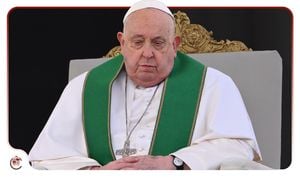The anticipation builds as Germany prepares for the upcoming federal election on February 23, 2025, which will determine the nation’s future leadership. Voting will begin at 8:00 AM, with all polling stations closing at 6:00 PM. Over 59 million eligible citizens are noted to be casting their votes at around 65,000 polling locations across the country, supported by approximately 675,000 volunteers.
According to various pre-election surveys, the CDU, led by candidate Friedrich Merz, is favored to secure the most significant share of votes, overtaking rivals including the AfD, SPD, and the Greens. Interest remains high as the first reliable results are anticipated on election night. Predictions based on exit polls will be shared immediately after polls close, providing early insight before the first official projections emerge.
Media coverage on the night of the election will be extensive, with numerous outlets presenting live updates, analyses, and results. The MDR is set to report results thoroughly for regions such as Saxony, Saxony-Anhalt, and Thuringia. Viewers can tune in from as early as 5:00 PM on election day, with the main broadcasts highlighting the distribution of votes and party reactions throughout the evening.
Simultaneously, other networks, including ARD and ZDF, will present their updates and analyses of the electoral process, emphasizing the significance of the CDU's performance under Merz’s candidacy. Focusing on the public's expectations, significant insights and reactions will emerge shortly after the first projections are revealed at around 6 PM.
Major candidates such as Olaf Scholz are also keeping a close eye on the forecasts as he aims to retain his position as Chancellor amid tough competition. Observers speculate Scholz's current standing is precarious based on recent surveys indicating low support for the SPD.
Assessment of each party's performance will break down across the various states and might result significantly different from prior expectations, particularly for smaller parties who also face uncertainty about meeting the five percent threshold necessary for parliamentary seats. Both the AfD, aiming for growth amid migration debates, and the FDP, feeling pressure to sustain parliamentary presence, are under appraisal as preliminary results start flowing.
The election brings unique challenges, with procedural changes impacting vote counts and outcomes due to reforms instituted within the election framework. This year's method emphasizes not just the candidates but also hinge on how well their respective parties perform statewide.
Individuals eager for results can expect live ticker feeds and interactive maps detailing real-time results from Germany's 11,000 municipalities. Hence, voters can engage more directly with their local electoral outcomes, allowing them to measure how their communities align within the broader political picture.
Overall, the utilization of the exit polls, fast results, and accessible reporting formats should satisfy the public's appetite for both timely and detailed information as the country navigates this pivotal election night. By around 6:15 PM, official projections will start to indicate early trends, which are likely to evolve as more data becomes available.
Election overview emphasizes the importance of public engagement, with measures like the Wahlomat available for voters seeking guidance on which party aligns most closely with their preferences. The night will culminate with the preliminary counts being released, but actual confirmation of the results is anticipated to take weeks, culminating the final tally published by the Federal Election Office.



